Top 10 Books of the Year
Last week’s version of this bulletin included notice of Tony Judt’s latest opus. Sadly, this week’s news is that Judt has passed on, as some express it, to his greater glory. Here’s the New York Timesobituary. My colleague Mike Smith at this fortress of truth and fair play has assembled a useful sampler of Judt’s work. Rest In Peace, Tony Judt.
* * *
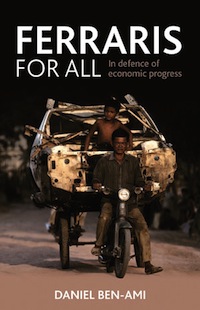
Whether or not you are an advocate of so-called economic progress—an issue fraught with all sorts of distracting baggage—there seems to me no doubt that Daniel Ben-Ami does an estimable job marshalling all arguments and statistics to make such progress an attractive pathway to a brave, new, and wonderful world, and his monograph, Ferraris for All: In Defence of Economic Progress (Policy Press), is a most readable foray into the dismal science.
Here is Ben-Ami from his website:
Square MileEvening Standard
The devil Ben-Ami takes on is what he calls “growth skepticism,” by arguing that society as a whole benefits from greater affluence. Of course, his figures are aggregates, so personal wealth, for instance, can be claimed to have risen on the average even if the rising average leaves millions of lives unchanged.
In any case, Ben-Ami is a bright and engaging fellow to whom it is well worth paying attention.
* * *
Tom Engelhardt continues to provide useful service to that sliver of the American population who have not been lulled into somnolence by various opiates of the people. His new book, The American Way of War: How Bush’s War Became Obama’s (Haymarket Books), doesn’t reveal anything you didn’t know, if you were paying attention—the problem being that many of us have lives that require focus on the banalities of providing food, shelter, and health care to ourselves and our loved ones, after which comes an attempt to wipe out thoughts and memories of the nasty shit we have to do and swallow to provide.
The good folks at Democracy Now can be counted on to help you read and listen to Engelhardt illuminate the darkness that is our war state. Engelhardt explicates further.
* * *
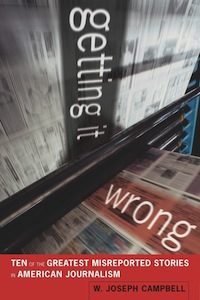
W. Joseph Campbell, a professor in the School of Communication at American University who has penned four other books on journalistic history, including Yellow Journalism: Puncturing the Myths, Defining the Legacies and The Year That Defined American Journalism: 1897 and the Clash of Paradigms, offers a useful book in Getting It Wrong: Ten of the Greatest Misreported Stories in American Journalism (University of California Press), which among other things answers the question about the importance of debunking media-driven myths.
Among the media missteps are the Hearst-Remington exchange, “I’ll furnish the war”, Murrow vs. McCarthy, the Bay of Pigs, Cronkite and Vietnam, and Jessica Lynch’s “fight to the death” in Iraq.
Ed Kosner has an interesting take on the book:
For all Mr. Campbell’s earnest scholarship, these media myths are certain to survive his efforts to slay them. Journalism can’t help itself—it loves and perpetuates its sacred legends of evil power-mongers, courageous underdogs, dread plagues and human folly. At the end of the book, Mr. Campbell offers some remedies for media mythologizing, urging journalists, among other things, “to deepen their appreciation of complexity and ambiguity.” Good luck with that, professor.
* * *
Thankfully, years of television viewing have allowed me to develop the facility to totally block out the sponsors of commercials even when I pay attention to the content. There is an ad running currently that features various buildings being covered in an orange curtain to the strains of Nick Drake’s mournful voice. This, of course, caused me to think of the artist Christo and his numerous projects, none more famous than his 1976 unfurling of a white curtain along a fence that ran for almost 25 miles in northern California from Sonoma County to the Pacific Ocean. The 18-foot-high construction only stood for two weeks but represented much more in the effort to create it and the impact it had.
Remembering the Running Fence by Brian O’Doherty does Christo’s vision justice and accompanies an exhibition at the Smithsonian Art Museum, which runs through September.
* * *
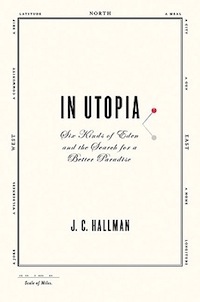
Based on the evidence to date, J.C. Hallman is something of a literary polymath jumping from fiction, long and short, to nonfiction with ease. A quick glance at his bibliography should affirm that. His new opus, In Utopia: Six Kinds of Eden and the Search for a Better Paradise (St Martin’s), is an accessible intellectual history blended with witty and smart reportage. Andrei Codrescu, who knows about such efforts, comments:
J.C. Hallman is a superb hunter of contemporary utopias, those systematic efforts at improving humanity that still move us, despite the spectacular failures of the last century. Deep in the American psyche there lives a striving for perfection, and the dreamy traveler in this saga uncovers it with vigilant affection. From still-extant hippy communes to floating islands and multi-billion dollar new cities, this is a breathless and hard to put down adventure.
* * *
When Jennifer Vanderbes’s debut novel, Easter Island, was published, I put it on my reading list based on some choice remarks in Robert Stone’s blurb. Sadly, as is often the case, I was distracted and never fulfilled my intention. Her new book, Strangers at the Feast (Scribner), sent to me by her editor, Alexis Gargagliano, went straight to the top of the tower of books I have promised myself to read. Being an account of a borderline nightmare that one family encounters on Thanksgiving 2007, on the face of it the story did not hold much allure, and yet the crystalline prose and seemingly accurate characterization of the various family members trumped the storyline to the end.
* * *
Boston crime story writer Chuck Hogan has engaged my attention from the very beginning with his excellent novel The Standoff, which was based on the infamous incident at Ruby Ridge where the F.B.I. was stood off by Randy Weaver. His latest, Devils in Exile (Simon & Schuster), has a clever plot using U.S. armed forces veterans as vigilantes fighting the drug trade, and he certainly makes clear his sympathies for the vets and his understanding of the problems they encounter reentering so-called civil society.
Hogan’s excellent novel Prince of Thieves has spawned a film entitled The Town, set in Boston’s infamous Charlestown and directed by Ben Affleck.
* * *
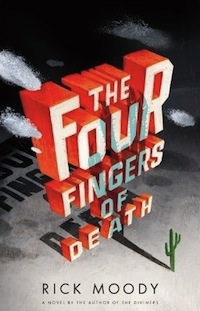
Rick Moody is an accomplished novelist. The Four Fingers of Death (Little, Brown), his ninth novel, is a well-executed homage to Kurt Vonnegut, which means it is rife with good humor and on-target satire. Here Moody explains:
Catch 22Crying of Lot 49Sirens of TitanGod Bless You Mister RosewaterSlaughterhouse Five
And on his website Moody engages in—well, you tell me…
This, therefore, would be a website devoted to my work. And I thank you for coming. It’s true that I have never got around to collaborating on a website devoted to me. There was a near miss in 2000 or so. The company designing that website folded. And two years ago a good friend suggested that the absence of a Rick Moody website was “too bad,” and this friend offered up his wife, a very great designer. Again, I somehow never got around to it. That there is a website now indicates mainly that there is a new book to sell (and some backlist), as there is also, in the world, a desire to find new ways to sell books, now that the going-out-on-the-road part of the whole process has been somewhat debunked. Part of the idea of the website, I am told, involves new content from me, the person nominally associated with the website. When this request was made, I demurred at first, simply because I have books to write, and a family, and a music column. Still, in the end I decided I could take a few minutes, in this space, to elucidate my dream of becoming a life coach.
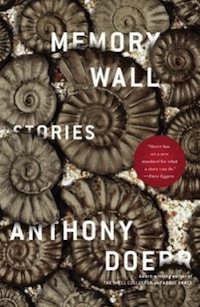
Full disclosure requires that I announce that Tony Doerr is a colleague of mine here at The Morning News (although he was not at my son’s bris nor have I ever met him). Nonetheless, I can in good conscience offer Memory Wall (Scribner) for your delectation. Jim Shepard shares my high opinion:
Memory Wall
I don’t know how I came to read Les Back’s The Listeners, but I am happy to put it down to one of the joyous serendipities that one encounters in dwelling on the internet. Back cites Primo Levi, Studs Terkel, and Fleming Røgilds, and opines:
The main lesson offered by the examples discussed here is that listening is not merely the instrumental extraction of information or a matter of “ticking the box” of consultation. What is animated in the “Canto of Ulysses” is an alternative way to live, achieved through two people hearing each other. This active listening creates another set of social relations and ultimately a new kind of society, if only for an hour.
Yeah, what he said.
